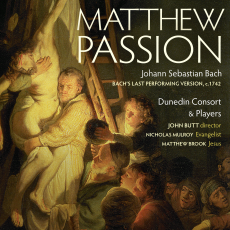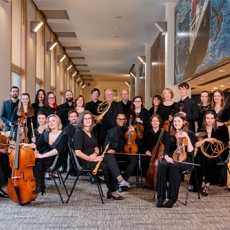JS Bach Matthew Passion - Dunedin Consort - Audiophile Audition
The Dunedin Consort follows up its Gramophone-winning Messiah recording with this equally affecting rendition of Bach's seminal St. Matthew Passion. There are those of course who have an allergy to this work; and with the spate of old-fashioned recordings on the market (I have never warmed to the EMI Klemperer) it is no wonder that new generations might wonder what all the fuss is about. But for those of us who know and love the work, its mysteries keep on revealing themselves time after time. More modern recordings are offering a new take on this old warhorse, and this one should contribute to that process significantly.
I will not go too much into the now 20-some-year-old argument about one-to-a-part, first proposed by Joshua Rifkin and used in his recording of the B-minor Mass on Nonesuch. Suffice it to say that I think it wrongheaded; such a radical notion based only on copies of performance parts is not enough to convince me of anything remotely like what Rifkin says, especially considering what we know about Bach's own situations and the demands and expectations of his employers. No composer in history has ever wanted smaller ensembles for orchestral music until we get to the last century, and bigger would certainly be desirable to virtually every Baroque composer who ever lived. But I am willing to agree that there may have been some instances where this practice was employed out of necessity if not out of desire, and the richness and subtle singing of the Dunedin Players are quite persuasive indeed. Though the notes try to make us believe that this one-to-a-part singing adds greater clarity to the work, a cursory hearing of Philippe Herreweghe's Harmonia mundi recording shows that this just isn't the case; Herreweghe achieves amazing results with his choir, and gets some added beef that is not present in this reading. His recording still stands at the top of the heap of modern versions.
But this release cannot be dismissed if for no other reason than the quality of the performance. Its nearest competition is the slightly older reading on Archiv by Paul McCreesh and his Gabrieli Consort, replete with very fine singing (including a young Magdalena Kozena), but as always with McCreesh, brutally fast tempos. Here the tempo question is tempered somewhat to far more realistic and musical proportions, the singing nearly as good, and the sound truly spectacular. I almost found myself adjusting to the small chorus, and enjoyed every moment of this considered and very well-prepared reading. Do go for a recording with a full chorus, as you are missing something if you don't, but for sheer musical expression and glorious surround sound, this one is tough to beat.

